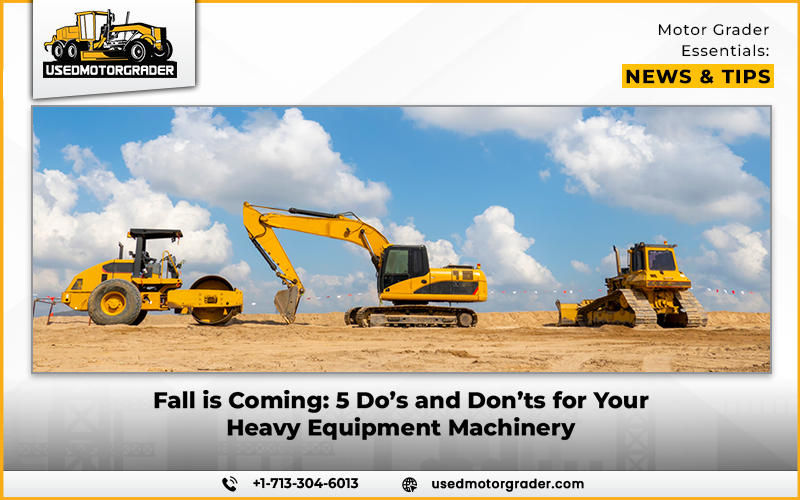With the summer ending and colder seasons coming, contractors are aware that it is time to change gears. Fall is not only a matter of scheduling project schedules, but it is also an important time to get Heavy Equipment Machinery ready to be able to work under more difficult conditions, lower temperatures, and finally prepare to work in winter. Failing to prepare seasonally may reduce machine life, escalate downtime, and lead to more costly repairs. Conversely, a proactive strategy makes machines reliable, efficient, and safe. The following are five key dos and don’ts that should be remembered during this fall.
Do: Conduct Thorough Inspections Before Temperatures Drop
The ideal time to have a thorough check of your equipment is fall. Cold weather is very unkind to components, and catching problems early is key to preventing an expensive failure when machines are most needed.
- Inspect worn or deteriorated components, in particular, the hydraulic hose, belts, and seals, which could crack at lower temperatures.
- Check tires or tracks and make sure that they are well-treaded in case of slippery weather.
- Safety systems, such as lights, brakes, and alarms to ensure that they are working well. Solving these minor problems now means that you are preparing your heavy equipment to work optimally when you have to meet seasonal workloads.
Don’t: Ignore Fluids and Filters
Fluids form the blood of heavy machinery, and operators should give them special care before temperatures drop drastically. One of the quickest methods of breaking engines and hydraulic systems is disregarding them.
- Never leave old oil, coolant, or hydraulic fluid to stand unchanged until the cold weather comes.
- Change filters on time to avoid blockage and low performance.
- Have fluids winterized or treated to resist freezing, so crucial systems are not damaged at great expense. Even a bit of preventive maintenance here will not only ensure the smooth running of machines but also avoid sudden downtime.
Do: Protect Equipment with Proper Storage
Unpredictable fall weather, with rain, frost, and wind, destroys equipment that operators leave uncovered. The right storage goes a long way in securing your investment.
- Keep store machinery in the dry or cover it with heavy-duty covers to keep it dry and free of rubbish.
- In a colder climate, insulated or warmed storage can stop the problem of freezing, and it is easy to start.
- In case machines are idle for long periods of time, unplug batteries and charge them separately to avoid leakage. Consider storage as an insurance policy for your Heavy Equipment Machinery. The better it has been secured, the greater will be the duration it will remain useful to you.
Don’t: Overlook Cleaning and Lubrication
One can easily underrate the role of dirt and grime, and failure to take this step may be expensive in the long term.
- Machines that are left dirty, muddy, and covered in debris may corrode, particularly when the moisture of fall is added to them.
- Lubrication is bypassed, resulting in unnecessary wear of joints and moving components.
- Lack of cleaning radiators and cooling systems also lowers efficiency and exposes them to overheating. Cleaning and lubricating machinery also helps to maintain the cost of maintenance at the right level, as well as enhancing performance.
Do: Plan for Efficient Cold Weather Operation
The fall is also about getting ready for the next thing, which is cold-weather operations. Some careful measures will now render winter work easier and safer.
- Install block heaters to warm engines and make them operational during low temperatures.
- Otherwise, switch to seasonal-grade fuel or additives to inhibit gelling.
- Educate train operators on safe operation methods, including extended warm-up periods and careful operations on slippery ground. Once prepared, operators will be able to run heavy equipment with confidence that it is up to the task of the season.
Don’t: Delay Preventive Maintenance
Perhaps the worst error that contractors make is to delay the routine maintenance until later. Any delay at this point can turn out to be a costly breakdown at the busiest time.
- Delay in maintenance can cause expensive emergency repairs during winter.
- Not paying attention to minor problems tends to lead to significant component failures.
- Waiting through the busy season limits service availability and raises repair costs. This is because proactive maintenance saves money in the long run and keeps Heavy Equipment Machinery reliable when projects cannot afford to go offline.
All Points Considered
Fall is not just any other season; it is the decisive one on the way to winter. Contractors who make time to check, service, and store their Heavy Equipment Machinery in a good location prepare themselves to lessen their breakdowns, reduce the rate of accidents, and increase their overall performance. These are just a few simple dos and don’ts that not only help to increase equipment life, but also save your bottom line. Fall preparation will ensure that you take up projects with no fear of the weather.
FAQs
Q1. Why is fall maintenance so important for heavy equipment?
A: Fall prep assists in identifying minor problems early in their development, avoiding downtime and prolonging the life of the machine since colder weather puts pressure on systems.
Q2. Which fluids should operators check before colder weather?
A: Operators should check, change, or treat engine oil, coolant, hydraulic fluid, and fuel with seasonal additives.
Q3. How can proper storage extend the life of machinery?
A: Operators should store machines in shelters or cover them to protect against corrosion, moisture damage, and battery drain during idle time.
Q4. What’s the biggest mistake contractors make when preparing equipment for fall?
A: Postponing maintenance turns small issues left unaddressed in the fall into costly problems during winter.
Tags: Used heavy equipment, Top heavy equipment models 2025, Road motor grader, Types of construction vehicles


